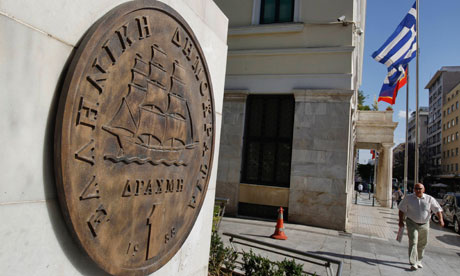guardian.co.uk, Wednesday 16 May 2012 22.26 BST
Britain's huge banking sector will find itself on the frontline if Greek voters reject austerity, says Heather Stewart
A replica of a drachma coin in Athens. The shockwaves from a Greek departure from the euro 'would arrive in the UK pretty swiftly'. Photograph: Yorgos Karahalis/Reuters
In September 1938, Neville Chamberlain described the growing conflict between Germany and Czechoslovakia as "a quarrel in a faraway country between people of whom we know nothing". It would be easy to think much the same about the crisis in Greece, but, be assured, that would be as mistaken as Chamberlain was then.
The centre of this crisis – Athens – may be 1,500 miles from Britain, but the shockwaves would arrive in the UK pretty swiftly. Britain's huge banking sector will find itself on the frontline if Greek voters reject austerity and the country dives out of the single currency.
Many banks have shrewdly slashed their direct exposure to Athens over the past 12 months; but the impact of a "Grexit" would be much broader than a drop in the value of Greek bonds. It could hit lending, force up the rates banks charge for finance and make life far more difficult for the exporters so key to recovery.
Italy and Spain (countries in which British banks are far more exposed) have struggled to convince the markets they are capable of tackling their debt mountains and it is likely they would come under intense pressure. Their borrowing costs would spike as investors fretted about another country following Greece towards the exit and spiralling bond yields can rapidly turn a tricky budgetary situation into a full-blown fiscal crisis. Bailed-out Portugal and Ireland would also come under renewed pressure.
As banks across the continent tried to assess their own and each other's exposure to this kaleidoscope of risks, there would be a severe threat to the entire European financial sector.
Britain's financial institutions, owing to their sheer size and heavy international exposure, would find it impossible to escape the collateral damage from a euro meltdown. That would inevitably push up borrowing costs for firms and consumers on this side of the Channel – including mortgages, for example – and could even leave some British banks in need of more government help.
The second route through which the effects of a Greek departure from the euro would arrive in the UK is via slumping overseas trade. Despite the exhortations of Vince Cable and other ministers for Britain's firms to focus on opening up new markets in Asia and Latin America, Europe still accounts for around half of British exports.
Ironically, given that George Osborne has sketched out his position in sharp opposition to his "feckless" European colleagues, rising exports to eurozone countries were one of the few bright spots in the UK's dismal economic performance over the past 12 months. But with the eurozone sliding into recession, sales to the worst-hit countries are now in decline. The latest official figures showed an 8% fall in exports to Spain, and a 7% drop to Italy over the three months to March. That effect will only worsen in the coming months, as the economic downturn deepens, driven by political chaos and plunging business and consumer confidence.
The effect of declining demand from these struggling economies on the UK is likely to be compounded by a rise in the value of sterling against the euro, as investors flee the troubled single currency and seek the safety of alternatives, including the pound, undermining the efforts of exporters.
All this will be hitting an economy that had been flatlining for 18 months, and has now tumbled into the first double-dip recession in decades. While it admits to drawing up contingency plans for the event of a euro collapse, the Bank of England has conspicuously refused to publish estimates of the economic consequences for the UK.
However, independent analysts have been less wary of making predictions; and the consensus is that if the euro implodes, the recession will be longer, deeper and more painful than anyone could have predicted.
Danny Gabay, of Fathom Consulting, for example, predicts that the impact of a euro breakup on the economy would be "roughly half as bad again" as the collapse of Lehman Brothers.
Greece in crisis: this is not a quarrel in a faraway land | Analysis | Business | The Guardian

